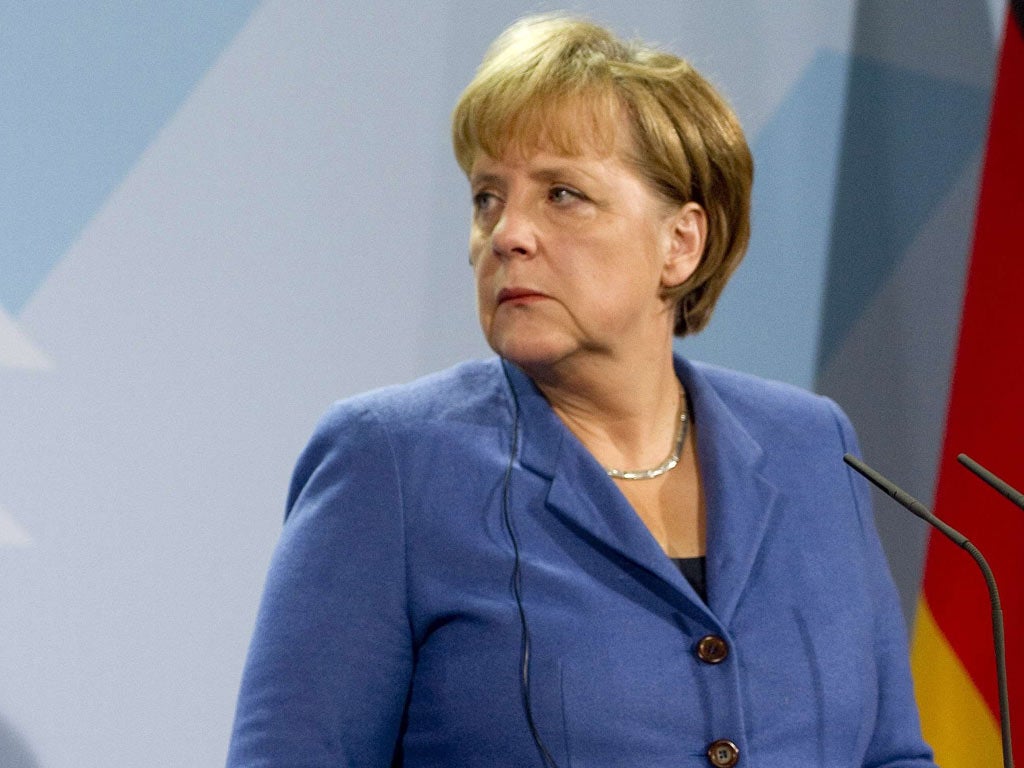Cameron to push Germany for decisive end to European crisis
British officials insist several other countries also share an aversion to revising the EU treaty

Your support helps us to tell the story
From reproductive rights to climate change to Big Tech, The Independent is on the ground when the story is developing. Whether it's investigating the financials of Elon Musk's pro-Trump PAC or producing our latest documentary, 'The A Word', which shines a light on the American women fighting for reproductive rights, we know how important it is to parse out the facts from the messaging.
At such a critical moment in US history, we need reporters on the ground. Your donation allows us to keep sending journalists to speak to both sides of the story.
The Independent is trusted by Americans across the entire political spectrum. And unlike many other quality news outlets, we choose not to lock Americans out of our reporting and analysis with paywalls. We believe quality journalism should be available to everyone, paid for by those who can afford it.
Your support makes all the difference.David Cameron will today oppose Germany's call for a new European Union treaty when he meets Angela Merkel in Berlin for talks on the eurozone crisis.
At what is likely to be a tense meeting, the Prime Minister will argue that the immediate priority is to resolve the crisis rather than embark on a complex negotiation over a new EU blueprint that would leave the public cold.
British officials insist several other countries share Mr Cameron's opposition to a wide-ranging treaty revision, which would fuel demands by Eurosceptic Conservative MPs for a referendum on the UK's relationship with the EU.
Although they will seek to play down their differences, the two leaders may also clash over Germany's reluctance to allow the European Central Bank (ECB) to play a bigger role in bailing out eurozone nations because of fears that this would fuel inflation.
Yesterday the German Chancellor restated her opposition to the ECB becoming a lender of last resort. She told business leaders in Berlin that would be "no solution" to the crisis, saying: "If politicians think that the ECB can solve the problems of the eurozone, they are kidding themselves."
She said "solid political solutions" were the only way of dispelling market anxiety. She insisted that greater budgetary integration was necessary within the bloc.
She also predicted that Mr Cameron "will examine a stronger involvement with other countries" in Europe once Britain's deficit had been tackled.
Yesterday two close allies of Ms Merkel criticised the British stance. Volker Kauder, leader of her conservative parliamentary group, accused Britain of being too self-centred in its relationship with Europe. "Just looking for their own advantage and not being prepared to contribute – that cannot be the message we accept from the British," he said.
Michael Meister, the deputy leader, warned Britain against catering to nationalist sentiment over the euro. "I'm baffled that in Great Britain there doesn't seem to be a clear view of the consequences a collapse of the euro would have on the City of London," Mr Meister said. "He (Mr Cameron) seems to have missed the repeated notes of alarm coming out of London about the dangers from the crisis."
Ms Merkel has already threatened that the 17 countries in the euro will adopt their own treaty, allowing them to forge a fiscal union, if Britain vetoes one signed by all 27 EU members. Mr Cameron believes that any changes should be agreed by all 27, so that an inner group of 17 does not become a caucus that takes key decisions. He fears that could harm the single market and the City of London.
Before travelling to Berlin, he will hold talks in Brussels with Jose Manuel Barosso, president of the European Commission, and Herman Van Rompuy, president of the European Council – the 27 leaders who will discuss treaty changes at a summit on 9 December. Mr Cameron will urge them to ensure that the 10 nations outside the euro are not relegated to second-division status by the measures taken to resolve the current crisis.
A war of words between Berlin and London was sparked by a speech by Mr Kauder on Tuesday in which he accused London of "only seeking its own advantage".
PM keeps pace with Hamilton and Button
Jobs may be disappearing daily while dole queues get longer, but there is always some good news if you know where to look.
David Cameron found some by visiting Woking, Surrey, for the opening of a £50m McLaren sports-car factory. He was shown around by Ron Dennis, head of McLaren Automotive, and met the McLaren Formula One team's drivers Lewis Hamilton and Jenson Button, and the cyclist Mark Cavendish.
The factory, which has created almost 350 jobs, will build the McLaren MP4-12C super-car, which costs a minimum of £168,000. "I've been to a few factories. I've been to a few car-manufacturing plants in my time. I've never been to anything quite like this," Mr Cameron said.
It is the first time the F1 group has diversified into large-scale production of a road car – a move that will take it head-to-head with rivals Ferrari and Lamborghini.
Join our commenting forum
Join thought-provoking conversations, follow other Independent readers and see their replies
Comments